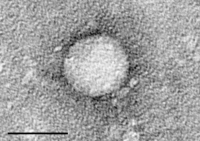
Photo from wikipedia
The etiology of autoimmune hepatitis (AIH) is unknown, though hepatotropic viruses may be potential triggers. Hepatitis E virus (HEV) infection, an increasingly recognized cause of acute hepatitis, has been misdiagnosed… Click to show full abstract
The etiology of autoimmune hepatitis (AIH) is unknown, though hepatotropic viruses may be potential triggers. Hepatitis E virus (HEV) infection, an increasingly recognized cause of acute hepatitis, has been misdiagnosed as AIH due to the occurrence of autoantibodies during its acute phase. It has also been suggested that HEV infection may lead to or unmask AIH. The HEV seroprevalence has been ascertained in patients with AIH, but the prevalence of AIH-related autoantibodies in patients with HEV infection has not been systematically tested. We aimed to investigate whether acute HEV infection is associated with the presence of AIH-relevant autoantibodies, following the liver autoimmune serology guidelines of the International AIH Group. We tested 48 patients with acute HEV infection. Half of them had at least one autoantibody, 17% two autoantibodies. Anti-nuclear antibody (ANA) were detected in 16 (33%), anti-smooth muscle antibody (SMA) in 10 (21%), and anti-neutrophil cytoplasmic antibody (ANCA) in 7 (14.6%). Of note, two patients showed SMA with VG or VGT patterns and five had ANA with homogeneous appearance, both being typical of AIH type 1. Other AIH-specific autoantibodies were negative. Atypical anti-mitochondrial antibody, without evidence of primary biliary cholangitis, was positive in one patient, disappearing at follow-up. Follow-up (median 12 months) serum was available from seven autoantibody positive patients: two became negative, while five remained positive, although no patient developed AIH to date. In conclusion, autoantibodies are frequently present during acute HEV infection, indicating that HEV should always be excluded before diagnosing AIH. Importantly, a minority of patients with acute hepatitis E develops AIH-specific autoantibodies, and, though they did not progress to autoimmune liver disease in the short-term, they warrant long-term monitoring.
Journal Title: Journal of autoimmunity
Year Published: 2018
Link to full text (if available)
Share on Social Media: Sign Up to like & get
recommendations!